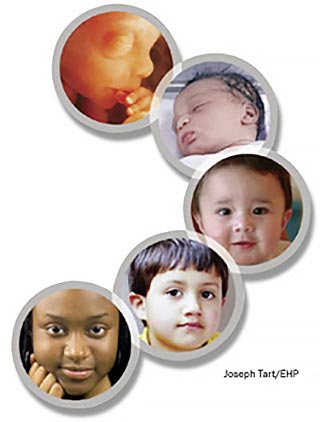Program Description
NIEHS is committed to understanding how the environment affects children’s development and health. Children’s environmental health research funded by the institute focuses on preconception, prenatal, and childhood environmental exposures to certain chemicals, pollutants, nutrients, and activities. It addresses a broad range of issues. Many factors contribute to children’s health, and research areas often overlap. Determining what chemical exposures may harm children requires a variety of research approaches.
Fetuses, infants, and children are vulnerable to environmental exposures and health effects. Exposure to contaminants in the womb or during childhood can lead to a variety of health effects, including developmental and behavior problems, childhood diseases, or an increased risk of chronic diseases later in life. Children and the developing fetus are particularly vulnerable to environmental contaminants because their organ, immune, and metabolism systems are not fully mature. In addition, infants tend to spend a lot of time crawling on the floor and putting their hands in their mouths, which can increase the likelihood of their exposure to contaminants.
What Is NIEHS Doing?
Researchers supported by NIEHS study how early life or low dose environmental exposures can have adverse effects on body systems in children by studying health outcomes such as autism, attention deficit hyperactivity disorder, cognitive dysfunction, behavior, asthma, neurodevelopment, immune development, sexual maturation, diabetes, obesity, and early cardiovascular changes.
Researchers seek to identify biomarkers that could indicate exposure to chemicals or susceptibility to disease. Some research focuses on how stress and the social environment may influence the way that environmental exposures affect children’s health. For example, NIEHS will be jointly funding research centers focused on the social determinants of health of children and adults in conjunction with the National Institute of Mental Health and Health Disparities. Factors in the social environment include poverty, lower-quality education, less access to healthy food, and psychosocial stress.
New research areas focus on the microbiome, placental epigenetics, and immune dysregulation as potential mechanisms for linking early life exposures to short- and long-term diseases and disabilities.
NIEHS efforts specific to children's environmental health research include:

- The NIEHS/EPA Children's Environmental Health & Disease Prevention Research Centers support research projects identifying health effects of environmental factors on children. Scientists at these Centers study the short- and long-term effects of how complex interactions between the environment, genetics, and other factors affect children's health such as co-exposures to contaminants and social stressors. They also work with community partners and health care providers to inform, advance, and disseminate information for public health protection. Impacts of the program are described in a recent report.
- The Children's Health Exposure Analysis Resource (CHEAR) program has provided children’s health researchers with access to laboratory resources and tools for analyzing their biological samples for chemicals and exposure biomarkers in studies that had not previously considered environmental exposures. This program has expanded into the new Human Health Exposure Analysis Resource (HHEAR) program that encompasses all human life stages (prenatal through adulthood). HHEAR encourages researchers to expand their studies to include environmental exposure analysis at no cost to them. The additional information may provide important clues about how the environment affects children’s health.
- NIEHS is part of the trans-NIH effort Environmental Influences on Child Health Outcomes (ECHO) Program, a seven-year research initiative launched in 2016 that will expand existing cohort studies to investigate how environmental factors affect child health and development. Research focuses on upper and lower airway health and development, obesity, and brain and nervous system development.
- Through its World Health Organization (WHO) Collaborating Centre for Environmental Health Sciences, NIEHS works with other WHO Collaborating Centres in Children’s Environmental Health and leading research institutions to help inform decision makers about the importance of preventing children’s exposures and reducing children’s health risks around the world.
- Children’s health is also addressed through the NIEHS Global Environmental Health Program, which supports research, research translation, and capacity building in the areas of cookstoves and indoor air pollution and global environmental health and sustainable development.
- The NIEHS Powering Research through Innovative Methods for Mixtures in Epidemiology, or PRIME, program supports researchers working to develop innovative statistical, data science, or other quantitative approaches that can be used to reveal how complex chemical mixtures lead to various adverse health effects in children and adults.
- NIEHS invests in well-characterized cohorts that include pregnant mothers, infants, children, and youth. Studies using these important epidemiology resources help reveal key determinants of environmentally-related diseases and health problems in children.
- NIEHS supports a variety of CEH research projects through the Superfund Research Program, Partnerships for Environmental Public Health, the Autism Research Program, and other programs that apply the latest scientific innovations and approaches to protect children from harmful environmental contaminants. The Autism Research Program funds research aimed at understanding how environmental exposures early in life may combine with genetic susceptibility to alter brain development to create the core symptoms of autism. This important research is helping to inform prevention efforts that reduce, or counteract, the effects of environmental factors that might be linked with autism.
Program Leads


Cindy P. Lawler, Ph.D.
[email protected]



